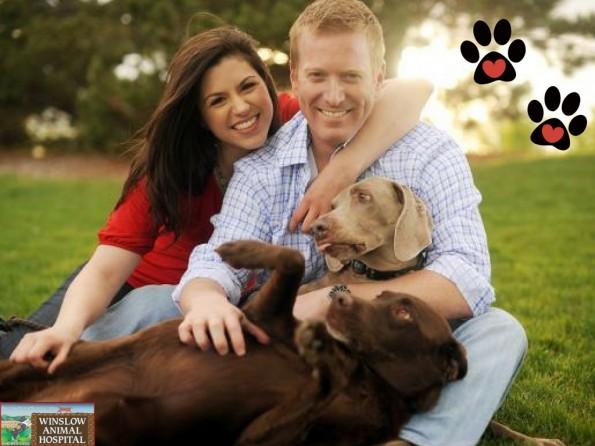
Valentine’s Day is a day for us to contemplate the meaning of love in its many forms: romance, friendship, family, pizza… you get the picture. Those of us with pets know that they are a tremendous source of unconditional love in our lives. While the value of a Valentine card may be lost on a pet, we can shower them with praise, play, and healthy treats to let them know we love them! It’s important that we are also aware of dangers that might be lurking about this week.

Flowers
Flowers are a classic gesture of love on Valentine’s Day. They can communicate romance or friendship or a range of emotions. There is a whole language of flowers!

Flowers can also be dangerous to pets! Roses are a classic V-Day gift. These flowers are not considered toxic to dogs or cats, but be sure any bouquets you have are de-thorned. Thorns could be a big problem for pets! There is also the chance of stomach upset if too much is ingested (roses aren’t your pet’s nutritious food, after all!). Other flowers can be toxic to pets, including hyacinths, daffodils, tulips, and especially lillies, which are very toxic to cats. Make sure flowers are off-limits to furry friends who would be interested in eating them!
Check the Pet Poison Helpline’s plant toxicity resource here!
Chocolate
Ah, the sweet amor of that heart-shaped box! Many people love chocolate and are reluctant to share their stash. When it comes to pets, that’s definitely a good thing! Usually, there is an increase in chocolate-related emergencies around Valentine’s Day, Halloween, and Christmas.
Chocolate contains caffeine and its cousin-chemical theobromine. These chemicals are generally safe in humans, but they can be deadly to pets. They are unsafe for both dogs and cats, though it’s usually dogs who indulge their sweet tooth. The animals’ ineffective metabolism of caffeine and theobromine can lead to dangerous symptoms such as tremors, vomiting, increased blood pressure, increased heart rate, and seizures.
Darker chocolates and cocoa powder are worse than milk chocolate, but any can cause problems. The chocolate toxicity meter (click here) can help you gain an understanding of how various chocolates will impact an animal of your pet’s size. If your pet has eaten chocolate, take your pet to an emergency clinic right away!

